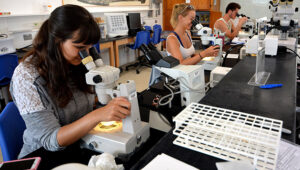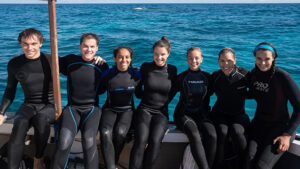Ocean Science Overseas

BIOS’s fall semester program combines coursework, field excursions, and research to provide undergraduate students with an ideal experiential learning environment. The 2020 fall semester program, which is open to undergraduate students from any college or university, will run from August 31 through December 11. Many fall semester students have returned to BIOS to work as teaching assistants or paid interns, while others have co-authored papers in peer-reviewed scientific journals based on their research with the Institute’s faculty and scientific staff.
In 2000, BIOS realized its vision of serving as a year-round educational institute with the development of spring and fall semester programs designed for undergraduate students interested in ocean and atmospheric sciences. The initial fall semester program consisted of three courses—coral reef ecology, marine invertebrate zoology, and marine biology and oceanographic research—and was created in partnership with the University of Rhode Island (URI) and Roger Williams University (RWU), both located in Rhode Island on the east coast of the United States.
Since then, enrollment in BIOS fall semester courses has been opened to students at other colleges, but the partnership with URI and RWU, as well as the core course offerings, has remained. Over the years, course content has continually evolved to reflect new scientific understanding and advances in research technologies. In 2006, a research diving methods course was added to the fall semester program with the goal of providing students with underwater research qualifications upon graduation.
“The BIOS fall semester program is designed to be a rigorous, intensive set of courses that provides students with high-quality education and the opportunity to engage directly with BIOS scientists and research investigations,” said Andrew Peters, associate scientist and director of BIOS university programs.

One of the many benefits of enrolling in the BIOS Fall Semester program is being able to earn academic credit for SCUBA diving through the Research Diving Methods course. Students also have the opportunity to explore Bermuda’s natural environment, from the unique network of underground caverns that dot the island to the annual mating of the marine glow worm.
This year, the BIOS fall semester program ran from August 31 through December 4 with students from RWU, URI, and Dalhousie University in Halifax, Nova Scotia, Canada. Students attended classes in morning and afternoon sessions, and also had the opportunity to participate in workshops on statistics, scientific writing, experimental design, and careers in science.
What does a semester at BIOS entail? The following is a compilation of course descriptions, as well as feedback from course instructors and students.
The Coral Reef Ecology course, co-taught by marine biologist and ecologist Samantha de Putron and BIOS reef ecologist Gretchen Goodbody-Gringley, covers a broad range of topics including coral disease, microbiology, and reproduction; reef biogeography; and reef fish ecology. Throughout the semester, students practice field research and laboratory analysis techniques in hands-on investigations of various reefs around Bermuda.
“As part of the course, we ask that students synthesize laboratory and field work into written lab reports, as well as a final oral presentation,” Goodbody-Gringley said. “Both of these are based on a typical format for presenting scientific results to an audience and give students experience in communicating science.”
The Marine Invertebrate Zoology course, taught by BIOS zooplankton ecologist Leocadio Blanco-Bercial, introduces students to the diversity and ecology of marine invertebrates from both an evolutionary and ecological perspective. The course emphasizes the diversity of animal forms and their adaptations to different ecosystems through a combination of lectures, laboratory exercises, and field trips.
“Bermuda is a great place to learn about marine invertebrates because it is home to a unique assemblage of sub-tropical organisms that live in its caves, mangrove forests, seagrass beds, coral reefs, and open ocean,” Blanco-Bercial said.
The Research Diving Methods course, taught by BIOS dive safety officer Alex Hunter, aims to familiarize students with the fundamentals of scientific diving and how scientists use SCUBA as a research tool. Over the course of ten weeks, students learn a variety of skills, including search and rescue procedures, survey methods, and underwater navigation and photography. At the end of the semester, students that pass the course are qualified Science Divers with First Aid/CPR and Emergency Oxygen Provider qualifications under the American Academy of Underwater Sciences (AAUS). They also have the opportunity to complete additional qualifications, such as Advanced Open Water Diver and Rescue Diver.
“The AAUS Science Diver certification is internationally recognized and highly sought after among many graduate schools and employers,” Hunter said. “Having this qualification as an undergraduate can help open doors to advanced studies and internships.”
Finally, the Marine Biology and Oceanographic Research course, taught by marine biologist and ecologist Samantha de Putron, takes place throughout the semester. Each student submits a research proposal outlining their experimental ideas and interests, then works with instructors and mentors to develop a project based on these proposals. Over a period of 12 weeks, students submit a full proposal, design or select research methods, and work full-time on their research. At the end, they’re required to submit results in a scientific paper suitable for publication in a journal and give an oral presentation to classmates, as well as BIOS faculty, staff, and interns.
“This course provides students with first-hand experience working in a research environment,” de Putron said. “By taking ownership of their projects, they learn skills that will benefit them down the road, such as organization, adaptability, and critical thinking.”
Bharathi Kolluru, a junior majoring in marine biology at RWU, saw the BIOS fall semester as a great opportunity to take challenging courses in a study abroad program, while also gaining research experience. “I love that we can apply what we are learning in class in the field, and that the scientists teaching the courses apply their personal expertise and research to the lectures,” she said. “I also like that we are becoming AAUS certified, as this is something that not many students have the opportunity to do.”
Alec Leitman, a senior in the marine biology program at RWU, heard about the fall semester program at a study abroad fair at his school. Having heard good things from fellow RWU students about their experiences at BIOS, he decided to apply. “I hope to return to BIOS in the future to conduct more research or even become an intern, as my time here has been incredible,” he said. “It’s been great experiencing what it’s like to live and work on a research station and seeing the differences in expectations compared with my home institution.”
Elizabeth Saraf, a junior in the marine biology program at URI, first heard about the BIOS fall semester program during her initial visit to the URI campus. Hearing how excited program alumni were about their experiences, she enrolled in URI specifically because of this opportunity. “The best part about the fall semester program is the community feeling and being surrounded by such amazing people,” she said.
If you are in your junior or senior year of undergraduate studies and working toward a bachelor’s degree in marine biology or a related field, the fall semester program at BIOS is a great opportunity to gain valuable skills and education while studying abroad. Plus, many colleges and universities allow students to receive academic credit for the courses they take at BIOS. The fall semester program is also a springboard to additional opportunities. In the past, fall semester students have returned to BIOS on research internships to continue projects started during this program; published their project results in peer-reviewed scientific journals; and gained work experience as a teaching assistant for BIOS summer courses.
